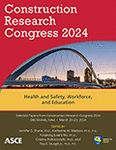Examining E-Learning Adoption in Construction Education in a Developing Country during the COVID-19 Pandemic
Publication: Construction Research Congress 2024
ABSTRACT
The COVID-19 pandemic led to the adoption of social distancing and the closing of public places. One of the public places affected was tertiary education settings where universities had to close. Without a physical school environment, some tertiary institutions resulted in e-learning. Therefore, this study examined e-learning adoption in construction education in a developing country during the COVID-19 pandemic. The study used a cross-sectional survey research design through an online questionnaire form. The study revealed the leading e-learning platforms used during this period. In conclusion, the study revealed the significant challenges and benefits of e-learning adoption in construction education during the COVID-19 pandemic. Beyond the COVID-19 pandemic, the study recommended more investment in e-learning infrastructure for both students and tutors.
Get full access to this article
View all available purchase options and get full access to this chapter.
REFERENCES
Afolabi, A. O., O. Oyeyipo, R. A. Ojelabi, and P. F. Tunji-Olayeni. 2017. “E-Maturity of Construction Stakeholders for a Web-Based e-Procurement Platform in the Construction Industry. ” Int. J. Civ. Eng. Tech., 8(12), 465–482.
Afolabi, O. O., and J. Uhomoibhi. 2017. “E-learning implementation in higher education: aspects of infrastructure development challenges and students learning approaches.” <https://pure.ulster.ac.uk/en/publications/elearning-implementation-in-highereducation-aspects-of-infrastru-3.> (June 11, 2022).
Agbele, A. T., and E. Oyelade. 2020. “Impact of COVID-19 on the Nigerian educational system: strengths and challenges of online/virtual education.” Asian J. Edu. Soc. Stud., 27–35.
Alvarez, A., Jr. 2020. “The Phenomenon of Learning at a Distance through Emergency Remote Teaching Amidst the Pandemic Crisis.” Asian J. Distance Edu., 15, 144–153.
Arbaugh, J. B., M. R. Godfrey, M. Johnson, B. Leisen Pollack, B. Niendorf, and W. Wresch. 2009. “Research in online and blended learning in the business disciplines: Key findings and possible future directions.” The Internet High. Edu., 12, 71–87.
Balogun, N. A., F. A. Adeleke, M. A. Abdulrahaman, Y. I. Shehu, and A. Adedoyin. 2023. “Undergraduate students’ perception on e-learning systems during COVID-19 pandemic in Nigeria.” Heliyon, 9, e14549, https://doi.org/10.1016/j.heliyon.2023.e14549.
Bisciglia, M., and E. Monk-Turner. 2002. “Differences in Attitudes between On-Site and Distance-Site Students in Group Teleconference Courses.” Am J Distance Educ., 16(1), 37–52. doi: https://doi.org/10.1207/s15389286ajde16014.
Brammer, S., L. Branicki, and M. K. Linnenluecke. 2020. “COVID-19, societalization, and the future of business in society.” Academy Mgt. Persp., 34(4), 493–507.
Garaus, C., G. Furtmüller, and W. H. Güttel. 2016. “The hidden power of small rewards: The effects of insufficient external rewards on autonomous motivation to learn.” The Academy Mgt. Learn. Edu., 15(1), 45–59.
Hu, X., J. Zhang, S. He, R. Zhu, S. Shen, and B. Liu. 2022. “E-learning intention of students with anxiety: Evidence from the first wave of COVID-19 pandemic in China.” J. Affective Disorders, 309, 115–122.
Jordan, C. 2020. “Coronavirus outbreak shining an even brighter light on internet disparities in rural America.” Economic Policy Institute: <https://www.epi.org/blog/black-and-hispanic-workers-are-much-less-likely-to-be-able-to-work-from-home/>(February 1, 2021).
Laasch, O., D. C. Moosmayer, and F. Arp. 2020. “Responsible practices in the wild: An actor-network perspective on mobile apps in learning as translation(s).” J. Bus. Eth., 161(2), 253–277.
Maheshwari, G. 2021. “Factors affecting students’ intentions to undertake online learning: an empirical study in Vietnam.” Educ. Inf. Technol., 26(6), 6629–6649.
Mailizar, M., D. Burg, and S. Maulina. 2021. “Examining university students’ behavioral intention to use e‑learning during the COVID‑19 pandemic: An extended TAM model.” Edu. Info. Techn., 26, 7057–7077.
Maqbool, S., et al. 2022. “Student’s perception of E-learning during COVID-19 pandemic and its positive and negative learning outcomes among medical students: A country-wise study conducted in Pakistan and Iran.” Annals Med. Surgery, 82, 104713, https://doi.org/10.1016/j.amsu.2022.104713.
Matli, W., and M. Phurutsi. 2023. “Students’ concerns about Online Remote Learning during COVID-19 Pandemic in the 4IR digital society.” Procedia Comp. Sci., 219, 971–976.
Mushtaha, E., S. A. Dabous, I. Alsyouf, A. Ahmed, and R. N. Abdraboh. 2022. “The challenges and opportunities of online learning and teaching at engineering and theoretical colleges during the pandemic.” Ain Shams Eng. J., 13, 101770, https://doi.org/10.1016/j.asej.2022.101770.
Nadworny, E., and A. Kamenetz. 2020. Education Dept. Says Disability Laws Shouldn’t Get In The Way Of Online Learning. NPR.org: <https://www.npr.org/sections/coronavirus-live-updates/2020/03/23/820138079/education-dept-says-disability-laws-shouldnt-get-in-the-way-of-online-learning>(February 1, 2021).
Ogolodom, M. P., A. N. Mbaba, M. S. Okpaleke, E. A. Okankwu, N. Alazigha, and O. E. Orevaoghene. 2023. “Online Learning in Nigerian Universities During COVID-19 Pandemic: The Experiences of Nursing and Radiography Undergraduate Students.” J. Radio. Nurs., 42, 128–135.
Palupi, I. R., and W. Raharjo. 2020. “Zoom as a Tool for Online Learning.” Proc. on Polit. Soc. Sci., 1(1), 161–165.
Tadesse, S., and W. Muluye. 2020. “The impact of COVID-19 pandemic on education system in developing countries: a review.” Open J. Soc. Sci., 8, 159–170.
Salahshouri, A., K. Eslami, H. Boostani, M. Zahiri, S. Jahani, R. Arjmand, A. B. Heydarabadi, and B. F. Dehaghi. 2022. “The university students’ viewpoints on e-learning system during COVID-19 pandemic: the case of Iran.” Heliyon, 8, e08984, https://doi.org/10.1016/j.heliyon.2022.e08984.
Serhan, D. 2020. “Transitioning from Face-to-Face to Remote Learning: Students’ Attitudes and Perceptions of using Zoom during COVID-19 Pandemic.” Int. J. Technol. Educ. Sci., 4, 335–342, doi:https://doi.org/10.46328/ijtes.v4i4.148.
Szopinski, T., and K. Bachnik. 2022. “Student evaluation of online learning during the COVID-19 pandemic.” Techno. Forecasting Soc. Chg., 174, 121203.
UNESCO. 2020. “COVID-19 educational disruption and response.” <https://en.unesco.org/covid19/educationresponse.>(November 23, 2022).
Wiederhold, B. K. 2020. “Connecting Through Technology During the Coronavirus Disease 2019 Pandemic: Avoiding “Zoom Fatigue”. Cyberpsychology Behav. Soc. Netw., 23, 437–438.
Information & Authors
Information
Published In
History
Published online: Mar 18, 2024
ASCE Technical Topics:
Authors
Metrics & Citations
Metrics
Citations
Download citation
If you have the appropriate software installed, you can download article citation data to the citation manager of your choice. Simply select your manager software from the list below and click Download.
